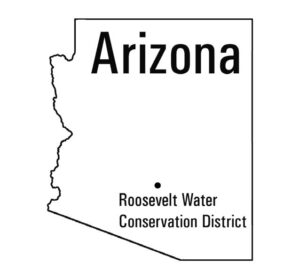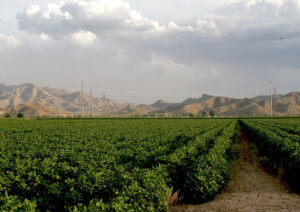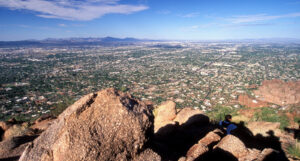The Roosevelt Water Conservation District (RWCD) has been serving farmers, urban irrigators, and other water users in the Phoenix, Arizona, region for almost a century. The district’s current service area is approximately 40,000 acres. As an essential business, RWCD has had to find new ways to operate during the COVID‑19 pandemic. In this interview, RWCD General Manager Shane Leonard tells Irrigation Leader about the challenges the agency has had to face and how it has changed its operations to overcome them.
 Irrigation Leader: Please tell us about yourself and about RWCD.
Irrigation Leader: Please tell us about yourself and about RWCD.
Shane Leonard: I am the general manager of RWCD, which is located in eastern Maricopa County, in the great state of Arizona. I am the fourth generation of my family working at the district. I received my degree from Arizona State University’s Morrison School of Agribusiness and Resource Management, majoring in finance and minoring in finite resource management. RWCD is approximately 40,000 acres in size, 10,000 acres of which is still irrigated, either in large-scale agricultural production or in municipal, industrial, and smaller-acreage backyard subdivisions. We currently have 50 employees. We produce approximately 70,000 acre-feet of water per year for delivery. Right now, we’re finishing moving into a brand-new facility, the first built in 100 years.
Irrigation Leader: How has the COVID‑19 pandemic affected your operations?
Shane Leonard: From a water delivery and operational standpoint, it hasn’t affected us directly, because we are an essential business and are required to make deliveries. What it has changed is how shift changes work for our employees. Our zanjeros work for 7 days in a row and then have 7 days off. Their shift changes are at 5:30 a.m. and 11:30 a.m. At those times, they used to come to their offices and update their partners on the day’s activities. Now, however, we’ve instituted a separation requirement and a disinfecting protocol. The zanjero who is coming off shift will go into the office, lay down the paperwork, disinfect everything, leave the office, and stand outside; the guy coming on shift will go into the office, grab the paperwork, make sure he understands what’s going on, and then come outside and talk with his partner about what tasks need immediate attention. Often, when the guy going off shift gets home, he’ll call in to make sure that everything is going well. From that point of view, we’ve had to make changes to ensure that we’re keeping our distance from one another and are disinfecting common areas, vehicles, and equipment.
On the administrative side, the pandemic has caused more problems because of the need to follow social distancing. We’ve had to reduce our office staff to a skeleton crew. Basically, we have only one person from each area come in at a time. For example, we have an assistant bookkeeper and a bookkeeper, two customer service representatives, and both an office manager and an assistant office manager, but right now we only have one of the bookkeepers, one of the customers service reps, and one of the office managers come in for limited hours to handle paperwork and get caught up on the previous day’s work. Then they leave, and we bring in another set of employees to handle the next day’s operations, disinfecting the whole time. We are keeping the paperwork up to a minimum standard so that we can make sure we understand where we are, both from the position of the district and with regard to water deliveries. Our building is currently closed to the public, which is ironic considering that it is our first brand new building in 100 years.
The situation has led us to rely more heavily on technology. Thankfully, we are in a new complex with technology that allows communication and basic operations. Assura Software is helping us out with our logistics and our repair and maintenance operations so that we can triage our tasks. One interesting thing is that our customer interaction has gone up since Arizona’s COVID-19 restrictions went into effect. We’ve had a tremendous increase in the number of people opening new accounts and reopening old ones. I believe the raw numbers indicate that our points of contact have increased by nearly 200 percent over the same time last year. Everybody’s at home, looking for something to do, and they realize that now is as good a time as any to go repair their irrigation systems, reopen their accounts, and so forth. In that sense, the COVID‑19 pandemic has caused a tremendous increase in the number of customers who have reengaged for irrigation and water service.

Our new building and technology will allow us, for the first time, to hold an entirely electronic board meeting. It will include not only our board members, but the public as well. The logistics of ensuring that we’re meeting our obligations to board members, the public, and open meeting laws are challenging, but my staff is up to the task. It’ll be interesting to see how that goes.
Irrigation Leader: What is the most innovative thing that you’ve done in response to the COVID‑19 situation?
Shane Leonard: In terms of direct operations, the main thing we’ve done, and I wouldn’t really call it innovative, has been to truly give our employees the authority to handle issues and incidents in the field in real time without needing to involve all the levels of management that we might have involved in the past. Department supervisors, managers, and area managers are not as readily available today because of remote work and staggered office hours. Our current crew of zanjeros has the ability to solve problems, at least temporarily, in the field. Now we’re letting them do it, whereas before we’d say, “Submit a field report, and we’ll get back to this issue as soon as we can.” Our customer compliments have increased, too!
This will not be surprising to those who are familiar with irrigation districts, but trespassing incidents have increased significantly because of the closure of parks and trails. People see that they can still get to the canal banks and are heading there instead. We could have responded by just saying, “You shall not do it,” but we are instead reaching out to the cities we have cojurisdiction with to try to work cooperatively with them to see if we can make this a public benefit. That’s probably a secondary item considering what’s going on, but it’s been surprising how quickly we’ve gotten traction on that.
The other thing that we did was suspend the collection of water charges. The day we closed the office to the public, we still took orders and made water deliveries, but we stopped suspending accounts that were in the red. Unemployment claims are up and everybody in the agricultural industry is now suffering. Our large agricultural customers were depending on what, up until 6 weeks ago, was going to be a good year; they bought feed and borrowed money accordingly and are now looking at tremendous losses. With that in mind, we suspended water charges on a temporary basis. I believe what’s going to end up happening is that RWCD will provide a one-time waiver for charges. Thankfully, we have the reserves to do allow for this should our board allow it.
RWCD is really trying to find ways to assist our growers with those issues. For example, Arizona dairies are dumping milk, culling cows, and doing whatever else they can to try and keep above board. Some dairy operators in the Phoenix area are expecting to lose $500,000–$1,000,000. They aren’t big enough to absorb that and survive. In short, if there is a way for RWCD to provide some relief to our customers, we’re going to find a way to do it.
Irrigation Leader: Do you expect any of the changes you have made to be retained after the pandemic is over?
Shane Leonard: One example that comes to mind is that The Arizona Group, our insurance brokerage firm, has come out with numerous recommendations for how business can turn several short-term solutions into long-term policies that will help us reduce our premiums going forward, including distancing, disinfecting, and work safety protocols.
The second thing that I could see retaining is refining procedures to continue to allow front-line staff to make more decisions without involving department managers or supervisors, particularly on the administrative and delivery side.

Finally, unfortunately enough, we will be formalizing a more detailed crisis plan to respond to events on this scale, including a possible resurgence of COVID‑19 this fall. We had emergency response plans in place, but they didn’t envision a pandemic on this level. One of the things that has been of concern to me is the lack of consistency in the federal, state, and local messaging on what to do to protect the health of your workers and the public. It’s been challenging to make sure that we’re meeting those obligations without going too far one way or another. It’s probably the toughest employee-public interaction situation we’ve had to deal with in recent times, because there is no primer for this. It’s been incredibly difficult to get logical, consistent recommendations or directions from the authorities. That’s a challenge that I hope we don’t have to deal with if and when this happens again.
Irrigation Leader: What advice would you give to other districts?
Shane Leonard: Stay nimble and talk to everyone whom you trust to give you accurate, logical, and beneficial advice. We’re grateful to have a number of former military and police personnel working for the district. One of the things that I did early on was to reach out to them and say, “You’ve got military training, you’ve got specialized training, if this were happening to you, what would you do?” Stay open minded, but firmly resolve to ensure the safety of your employees and the public. Stay in contact with your board members as is necessary to ensure they are informed. Doing so allowed me the confidence to make real-time decisions that were in the best interest of our employees and the public. Ultimately, I believe people will understand if you have water delivery issues. What they will have a hard time with, and what you should have a hard time defending, is performing your work but making employees and the public sick by doing so. That’s what we are trying to avoid, and that’s where we’re focusing on.
Shane Leonard the is general manager of the Roosevelt Water Conservation District. He can be contacted at s.leonard@rwcd.net.
